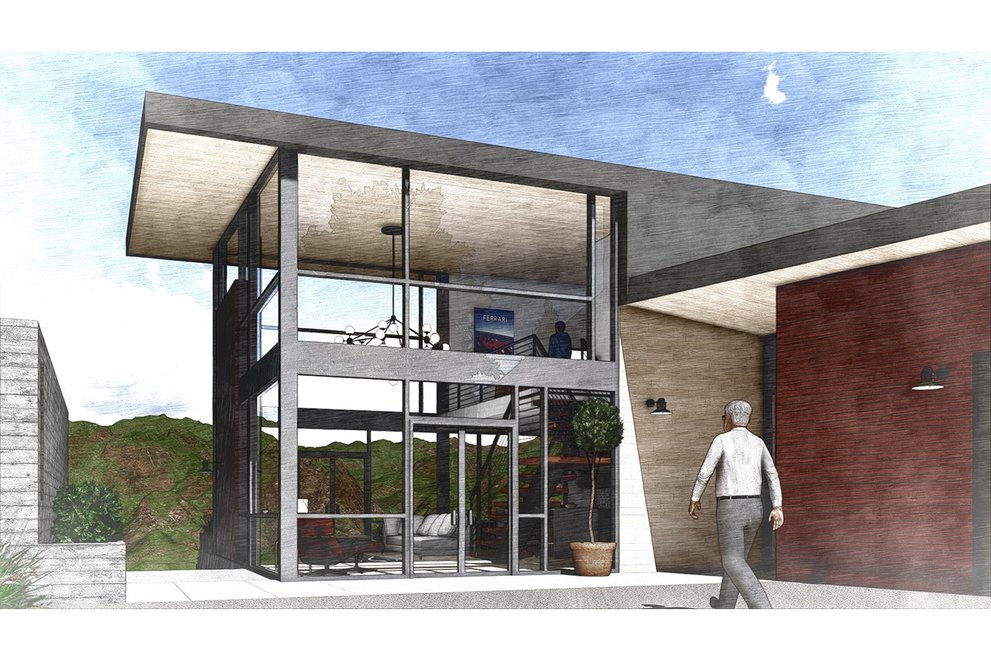An often overlooked design element for a window is the inclusion of an art glass panel. More often than not, possibly as a result of our desire for a lot of transparency between outside and inside, we’ve turned our backs on an architectural design feature that had been common for centuries. But maybe the time has returned to use art glass on those windows where views out aren’t all that desirable (such as the side wall of the neighbor’s house) yet we want as much natural light entering our home as possible Art glass panels can let the light in while giving us something attractive to look at. And in doing so can add a layer of detail and scale to a window that might be too large and scaleless otherwise.
Art Glass Basics
There are multiple sources, from big window manufacturers to local glass artists. Anderson has been providing art glass panels sized to fit just about all of their windows, and in a wide range of glass designs. Andersen even has a license to produce art glass panels in patterns designed by Frank Lloyd Wright. But don’t worry if you’re using windows manufactured by Pella, Marvin or any of the other companies. You can always have art glass made up to fit within the window you’ve selected. And you’ll be able to have the art glass designed to your specification rather than relying on a manufactured standard. This could be an especially nice way to make your home truly yours.
Today's art glass sits on the interior of the window, held in place by clips attached to the window sash. This lets you remove the panels for easy cleaning and repair or replacement. No more cold air infiltrating through all of the little pieces of glass. No more worries about the errant snowball or baseball smashing into the art glass.
Cost
Depending on size, design and maker, an art glass panel will add a few hundred to a few thousand dollars to the cost of a window. Because art glass panels can easily double or triple the cost of a window, I find that it’s something to be used judiciously. Perhaps at a stair landing or above a tub in a master bath. Someplace where you really don’t want to use blinds or drapes or some other window covering.
Materials
These panels are made of small pieces of glass held together by what’s called caming which was historically made of lead. Now, caming is a soft pliable metal that is easily shaped yet strong enough to hold the weight of glass. As for the glass, the pieces can be clear, colored, patterned, transparent, translucent or opaque depending on the desired effect. Make sure to review these details with the glass artisan or manufacturer so you get what you want. See the art glass colors from Anderson (below) for example.
Note that if you decide to use some colored glass, you’ll want the color to be intrinsic to the glass. Avoid using a painted piece of glass because the color can fade away over time.
Structure
An art glass panel can add a significant amount of weight to a window, especially a large window. So you’ll want to verify that the window (frame and hardware) can support the added weight of the art glass panel. Make sure that the the window can support the panel both closed and open -- when all of the weight of the panel is supported by the sash. Consult with an architect and the window manufacturer if you have any concerns about the structural integrity of the window.
Glass artisans
If you’re want a custom designed art glass panel you’ll want to locate a glass artisan. While this person doesn’t have to be local, it’ll probably save you time and money to use a local artisan. Use search engines like Google, ask local architects and designers, and/or visit local art galleries. Ask around to find an artisan's work you admire and then interview her or him.
Art Glass Basics
There are multiple sources, from big window manufacturers to local glass artists. Anderson has been providing art glass panels sized to fit just about all of their windows, and in a wide range of glass designs. Andersen even has a license to produce art glass panels in patterns designed by Frank Lloyd Wright. But don’t worry if you’re using windows manufactured by Pella, Marvin or any of the other companies. You can always have art glass made up to fit within the window you’ve selected. And you’ll be able to have the art glass designed to your specification rather than relying on a manufactured standard. This could be an especially nice way to make your home truly yours.
Today's art glass sits on the interior of the window, held in place by clips attached to the window sash. This lets you remove the panels for easy cleaning and repair or replacement. No more cold air infiltrating through all of the little pieces of glass. No more worries about the errant snowball or baseball smashing into the art glass.
Cost
Depending on size, design and maker, an art glass panel will add a few hundred to a few thousand dollars to the cost of a window. Because art glass panels can easily double or triple the cost of a window, I find that it’s something to be used judiciously. Perhaps at a stair landing or above a tub in a master bath. Someplace where you really don’t want to use blinds or drapes or some other window covering.
Materials
These panels are made of small pieces of glass held together by what’s called caming which was historically made of lead. Now, caming is a soft pliable metal that is easily shaped yet strong enough to hold the weight of glass. As for the glass, the pieces can be clear, colored, patterned, transparent, translucent or opaque depending on the desired effect. Make sure to review these details with the glass artisan or manufacturer so you get what you want. See the art glass colors from Anderson (below) for example.
Note that if you decide to use some colored glass, you’ll want the color to be intrinsic to the glass. Avoid using a painted piece of glass because the color can fade away over time.
Structure
An art glass panel can add a significant amount of weight to a window, especially a large window. So you’ll want to verify that the window (frame and hardware) can support the added weight of the art glass panel. Make sure that the the window can support the panel both closed and open -- when all of the weight of the panel is supported by the sash. Consult with an architect and the window manufacturer if you have any concerns about the structural integrity of the window.
Glass artisans
If you’re want a custom designed art glass panel you’ll want to locate a glass artisan. While this person doesn’t have to be local, it’ll probably save you time and money to use a local artisan. Use search engines like Google, ask local architects and designers, and/or visit local art galleries. Ask around to find an artisan's work you admire and then interview her or him.






